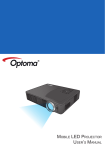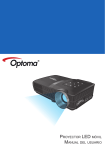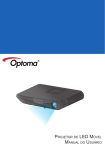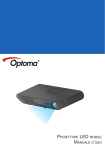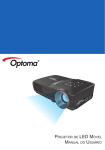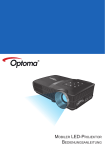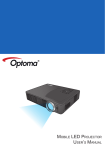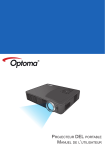Download Optoma ML300 data projector
Transcript
m i in AV mic ro B Us DM H ini Mobile LED Projector User’s Manual Important Safety Instruction CLASS 1 LED PRODUCT Eye Safety Warnings Avoid staring/facing directly into the projector beam at all times. Keep your back to the beam as much as possible. A stick or laser pointer is recommended to avoid the need for the user to enter the beam. When projector is used in a classroom, adequately supervise students when they are asked to point out something on the screen. In order to minimize power, use room blinds to reduce ambient light levels. A.2.9.31 Gloss of housing of peripheral (15th / 22 meeting AG1 EK1): devices The requirements for the gloss of housing apply to peripheral devices used at the visual display workplace according to BildscharbV. Peripheral devices intended for use outside the visual display workplace can receive a GS-Mark if the scope is indicated in the User’s Manual as well as the certificate. That means the following wording is possible in situations where the use within the field of view is not intended and where sufficient hints are given in the User’s Manual for the avoidance of such situations to ensure that display work is not affected. Wording in the certificate: “This device is not intended for use in the direct field of view at visual display workplaces. To avoid incommoding reflexions at visual display workplaces this device must not be placed in the direct field of view.” Regulation & safety notices This appendix lists the general notices of your Projector. FCC notice This device has been tested and found to comply with the limits for a Class B digital device pursuant to Part 15 of the FCC rules. These limits are designed to provide reasonable protection against harmful interference in a residential installation. This device generates, uses, and can radiate radio frequency energy and, if not installed and used in accordance with the instructions, may cause harmful interference to radio communications. However, there is no guarantee that interference will not occur in a particular installation. If this device does cause harmful interference to radio or television reception, which can be determined by turning the device off and on, the user is encouraged to try to correct the interference by one or more of the following measures: • Reorient or relocate the receiving antenna. • Increase the separation between the device and receiver. • Connect the device into an outlet on a circuit different from that to which the receiver is connected. • Consult the dealer or an experienced radio/television technician for help. 2 Notice: Shielded cables All connections to other computing devices must be made using shielded cables to maintain compliance with FCC regulations. Caution Changes or modifications not expressly approved by the manufacturer could void the user’s authority, which is granted by the Federal Communications Commission, to operate this device. Operation conditions This device complies with Part 15 of the FCC Rules. Operation is subject to the following two conditions: 1. this device may not cause harmful interference, and 2. this device must accept any interference received, including interference that may cause undesired operation. Notice: Canadian users This Class B digital apparatus complies with Canadian ICES-003. Remarque à l’intention des utilisateurs canadiens Cet appareil numerique de la classe B est conforme a la norme NMB-003 du Canada. Declaration of Conformity for EU countries • EMC Directive 2004/108/EC (including amendments) • Low Voltage Directive 2006/95/EC • R & TTE Directive 1999/5/EC (if product has RF function) 1.Do not block any ventilation openings. To ensure reliable operation of the projector and to protect from over heating, it is recommended to install the projector in a location that does not block ventilation. As an example, do not place the projector on a crowded coffee table, sofa, bed, etc. Do not put the projector in an enclosure such as a book case or a cabinet that restricts air flow. 2.Do not use the projector near water or moisture. To reduce the risk of fire and/ or electric shock, do not expose the projector to rain or moisture. 3.Do not install near heat sources such as radiators, heaters, stoves or any other apparatus such as amplifiers that emits heat. 4.Do not use the projector in direct sunlight. 5.Do not use near any appliance generating a strong magnetic field. 6.Do not use the projector in areas susceptible to excessive dust and dirt. 7.Turn off the product before cleaning. 8.Turn off the product before removing the battery. 9.Disconnect the battery if the product is not being used for a long period of time. 10.Ensure that the ambient room temperature is within 5- 35°C. 11.Relative Humidity is 5 - 35°C, 80% (Max.), non-condensing. 12.Do not expose the battery to temperatures above +60°C (+140°F) 13.New or idle batteries can have shortterm reduced capacity. Fully charge the battery before initial use. 14.Do not put the battery into your mouth. 15.Do not let the battery contacts touch another metal object. 16.Do not drop, throw or try to bend your product. 17.May explode if disposed of in fire. 18.Clean only with dry cloth. 19.Only use attachments/accessories specified by the manufacturer. 20.Do not use the unit if it has been physically damaged or abused. Physical damage/abuse would be (but not limited to): ▀■Unit has been dropped. ▀■Charger or plug has been damaged. ▀■Liquid has been spilled on to the projector. ▀■Projector has been exposed to rain or moisture. ▀■Something has fallen in the projector or something is loose inside. Do not attempt to service the unit yourself. Opening or removing covers may expose you to dangerous voltages or other hazards. Please contact your local reseller or service center before you send the unit for repair. 21.Do not let objects or liquids enter the projector. They may touch dangerous voltage points and short out parts that could result in fire or electric shock. 22.See projector enclosure for safety related markings. 23.The unit should only be repaired by appropriate service personnel. 24.Do not touch the projector for a long time while the projector is used. 25.CAUTION: Risk of Explosion if Battery is replaced by an Incorrect Type. 26.Dispose of Used Batteries According to the Instructions. Disposal of old Electrical & Electronic Equipment (Applicable throughout the European Union and other European countries with separate collection programs) This symbol found on your product or on its packaging, indicates that this product should not be treated as household waste when you wish to dispose of it. Instead, it should be handed over to an applicable collection point for the recycling of electrical and electronic equipment. By ensuring this product is disposed of correctly, you will help prevent potential negative consequences to the environment and human health, which could otherwise be caused by inappropriate disposal of this product. The recycling of materials will help to conserve natural resources. This symbol is only valid in the European Union. If you wish to discard this product, please contact your local authorities or dealer and ask for the correct method of disposal. Product Overview 14 5 6 7 8 15 16 17 23 VGA 1 mini HDMI 2 AV in micro USB 3 4 9 10 11 12 13 18 19 20 21 22 micro SD Remote Control PICTURE BY DC in 1.VGA Connector 2. Mini HDMI Connector 3.AV Input Connector 4. Micro USB Port 5.OK Button ( ) 6.Up Button ( ) 7.Cancel / ESC Button ( ) 8.Right Button ( ) 9. Left Button ( ) 10.Down Button ( ) 11.LED Indicator 12.Home Button ( ) 13.IR Receiver 14.Speaker 15.Elevator Foot 16.Lens 17.Focus Dial 18.Power Button ( ) 19.MicroSD Card Slot 20.Audio Out Connector 21.DC Input 22. USB Type A Port 23.Screw Hole for Tripod <Note> Items 5~10 and 12 are also function buttons. Functions vary depending on the current mode. Package Overview 1 2 1.Zoom (for external input only) 2. Power 3.Up/Volume Up 4. OK 5.Left 6.Down/Volume Down 7.Home 8.WiFi Display 9. USB Display 10.VGA 11. Video Mute 12.Cancel / ESC 13.Right 14.LED Mode 15.Video 16.HDMI ro SD mic DC in E BY PICTUR MI AV Hide 4 5 in mic 6 ro US B 1 Volume WiFi display VGA USB display HDMI Video 8 7 9 2 Standard Accessory 1. AC Power cord 2. Power adapter 3. Micro-USB to USB Type-A cable 4. Remote control with battery Zoom Hide 11 3 12 4 Volume 5 13 6 7 8 WiFi display USB display 14 9 10 VGA HDMI Video 15 16 <Note> When the projector is in playback mode, pressing items 8 or 9 will bring up the Home menu. 1. Connect the power adapter to the DC IN input jack on the rear of the projector. () 2. Insert one end of the AC power cord into the power adapter. () 3. Insert the other end of the AC power cord into a power outlet. () The LED indicator blinks red in standby mode. 4. Press the Power button ( ) to turn the projector on or off. (m) The LED indicator turns off when the projector is turned on. 3 i HD Zoom Power 2 Power On / Off min Power 1 5. AV cable 6. VGA cable 7. Carrying case 3 Optional Accessory 8. Mini HDMI cable 9. WiFi dongle ro SD mic DC <Note> •• The standard accessories may vary in each region due to different applications. •• The included power cord varies by region. For first time use, the Language screen appears. 1. Highlight the desired language. ( ) 2. Select the item. ( ) RE in BY PICTU 4 min i HD MI AV in mic ro US B 3 Adjust the Projected Image Adjust Projected Image Height Projection Distance (A) Aa Aa Screen Size - Height (C) Screen Size - Width (B) Screen Diagonal (D) Meter inch (mm) (inch) (mm) (inch) (mm) (inch) 0.5 21.62 366.2 14.4 228.9 9.0 432 17 1.0 38.16 646.2 25.4 403.9 15.9 762 30 1.6 63.60 1077.0 42.4 673.1 26.5 1270 50 1.9 76.32 1292.3 50.9 807.7 31.8 1524 60 2.6 101.76 1723.1 67.8 1077.0 42.4 2032 80 3.2 127.20 2153.9 84.8 1346.2 53.0 2540 100 3.9 152.64 2584.7 101.8 1615.4 63.6 3048 120 4.8 190.80 3230.9 127.2 2019.3 79.5 3810 150 5.8 228.96 3877.0 152.6 2423.2 95.4 4572 180 The projector is equipped with an elevator foot for adjusting the projected image height. To adjust the height: Turn the elevator foot to adjust the projected image position to the desired height. <Note> After a few seconds, if there is no changes, the projector will automatically adjust the image display via Auto Image Adjust function. ro SD mic DC in E BY PICTUR min i HD MI AV in mic ro US B o USB I AV in micr i HDM min Aa Adjust the focus until the image is clear. Connect input source - Composite AV Connect input source - VGA / HDMI onnect the VGA / HDMI device C using an appropriate cable. (~) The Projector will automatically detect the source. For more information, see "How to use external input source" on page 19. ro SD mic DC in E BY PICTUR min i HDM I AV in mic ro 1 USB Connect the AV input source. (~) The Projector will automatically detect the source. For more information, see "How to use external input source" on page 19. ro SD mic DC in E BY PICTUR min i HDM I AV in mic ro in USB 1 2 2 or or ro SD mic DC in E BY PICTUR min ro SD i HD MI AV mic in mic ro DC US B E BY DC in E BY PICTUR min i HDM I AV in mic ro 1 or ro SD mic USB PICTUR min i HDM I AV in mic ro USB 1 1 For video and audio input IPad 2 2 2 TM IPhone 4 or HDMI ro SD mic DC E BY PICTUR min i HD Apple Digital AV Adapter Audio input only 2 4 MI AV in mic ro US B 1 in in <Note> 1. All other brand and product names are trademarks or registered trademarks of their respective companies. 2. The cables connecting the video output devices are not supplied, please contact the device vendor or Optoma. 3. iPod nano/iPod touch/iPhone/iPod classic (version 5 and above) 4. Designed for iPod/iPhone/Mobile phone/ PMP with TV out functions. Using devices with audio signal voltage > 0.9Vrms is not recommended. Connect Computer for ro SD mic DC in E BY PICTUR min i HDM I AV in mic ro USB 1 USB Display Connect Computer You can project the computer display using the projector's micro USB port. 1.Connect a laptop or PC using the supplied USB to micro USB cable. 2. Turn on the projector. See "USB Display Mode" on page 24. ro SD mic DC in BY PICTURE i HDM AV in mic ro Data Transfer You can transfer data to the projector internal memory or the microSD card. 1.Connect a laptop or PC using the supplied USB to micro USB cable. 2.Turn on the projector. See "Data Transfer Mode" on page 24. min I for USB 1 2 2 <Note> The laptop/PC can only detect the input source when the projector is switched on. The projection will stop when this connection is made. Insert Data Source - MicroSD Card ro SD mic DC RE in BY PICTU min i HD MI AV in mic ro US B The projector projects media files directly from data sources: internal memory, microSD card, or external source (USB). Insert Data Source - USB (External Source) The projector reads data from the USB flash drive first if one is inserted. By default, the projector displays from the internal memory. However if a microSD card is inserted, the projector reads from the microSD card first. micro Insert a microSD card into the slot with the gold contacts facing down. Plug a USB flash drive into the USB Type A port at the back of projector. SD DC RE in BY PICTU min i HD MI AV in mic ro US B <Note> Support USB flash drive with FAT32 format. <Note> •• To remove the microSD card, push the card to eject it from the slot. •• Do not remove the microSD card while the projector is projecting image from the card. This can cause data loss or damage the card. •• Supports microSD card size up to 32GB. •• The microSD card is not included in the package. Use a Tripod Stand Screw a standard tripod into the screw hole on the projector. USB AV in micro I HDM mini <Note> The tripod is an optional accessory. 5 How to Use the Menu Enter Office Viewer menu Enter Music menu •• Press the corresponding button of the desired option. •• Press to go back a previous screen. Enter Video menu Enter Photo menu Select input source signal Enter Setup menu <Note> A button guide appears on the lower left corner of most screens (see below). The guide varies depending on the current mode. Press the corresponding button to select the option or operation. Return to the Home menu Home menu Submenu Video Music Photo Travel Video Travel Day1.mkv Input Office Viewer Internal Memory Setup Travel Day2.mkv Travel Day3.mkv Press matched symbol to enter specific function directly Data source icon The projector reads from memory sources in the following order: External source (USB) » microSD card » internal memory. Press the corresponding button of the menu item that you want to access. For example, to access Video, press . External source Video menu Internal memory MicroSD card Button guide Press the corresponding button to select the option or operation. Submenu Items 1/1 Travel Music Video Travel Day1.mkv Internal Memory Internal Memory Travel Day2.mkv Summer.mp3 03:31 Rainbow.mp3 04:28 Blue.mp3 03:20 Cat.mp3 03:45 Black Sheep.mp3 03:02 1/2 Photo Internal Memory Travel Day3.mkv Video menu Music menu Photo menu 1/1 Summer.doc Office Viewer Internal Memory Rainbow.ptt 6 Music Setting Back Display Setting Slideshow System 1,211 KB Blue.xls 143 KB Cat.doc 165 KB Black Sheep.doc 256 KB Office Viewer menu Video Setting 128 KB Setup Input menu Setup menu How to Play Videos - Source: Internal Memory / MicroSD Card / External Source Playing Videos from the Internal Memory, MicroSD Card, or External Source If an external source (USB) is inserted, the external memory is read first. If you want to read data from the microSD card or internal memory, press in the appropriate screen to change the data source. See steps below. 2. Select Data Source The screen, the source icon on the button guide, and the sequence in which screens appear vary depending on the available data source. If the external source or microSD card is not inserted, its screen is skipped when is pressed and the source icon on the button guide is not shown. 3. Select Video File Travel Video Travel Day1.mkv External Memory Travel Day2.mkv 1. Select "Video" Video Music Travel Day3.mkv Photo Travel Input Office Viewer Video Change data source Setup Travel Day1.mkv Internal Memory Travel Day2.mkv Travel Day3.mkv Press matched symbol to enter specific function directly Travel <Note> The displayed screen may vary depending on the selected data source on the previous step. Video Travel Day1.mkv MicroSD Card Travel Day2.mkv Travel Day3.mkv Change data source 4. Playback File or Travel Video Change data source Travel Day1.mkv Internal Memory Travel Day2.mkv Travel Day3.mkv If the selected video file is unfinished from a previous playback. No Playback from start Yes Video Playback mode (see page 8) Yes Playback from start Play from start? No Playback from last point 7 How to Play Videos - Video Playback Mode <Note> The button guide disappears when the keypad is not used for 3 seconds. To display the button guide, press any key except . Repeat Icons Repeat all Repeat one Repeat off Rewind Adjust volume <Note> To change repeat settings, see Video Settings below. Back to previous screen Pause/Play Return to Home menu Fast forward Video Settings 1. Select "Setup" 2. Select "Video Setting" Video Music Photo Input Office Viewer Setup Video Setting Music Setting Back Display Setting Slideshow System 3. Adjust Settings Repeat Browser Display Back Video Setting Setup Press matched symbol to enter specific function directly Repeat all Repeat one Repeat off Browser display: list view Browser display: thumbnail view 8 How to Play Music - Source: Internal Memory / MicroSD Card / External Source Playing Music from the Internal Memory, MicroSD Card, or External Source If an external source (USB) is inserted, the external memory is read first. If you want to read data from the microSD card or internal memory, press in the appropriate screen to change the data source. See steps below. 2. Select Data Source The screen, the source icon on the button guide, and the sequence in which screens appear vary depending on the available data source. If the external source or microSD card is not inserted, its screen is skipped when is pressed and the source icon on the button guide is not shown. 1/1 Music External Memory Summer.mp3 03:31 Rainbow.mp3 04:28 Blue.mp3 03:20 Cat.mp3 03:45 Black Sheep.mp3 03:02 3. Select Music File 1. Select "Music" Video Music 1/1 Photo Change data source Input Office Viewer Music Internal Memory Setup Summer.mp3 03:31 Rainbow.mp3 04:28 Blue.mp3 03:20 Cat.mp3 03:45 Black Sheep.mp3 03:02 1/1 Press matched symbol to enter specific function directly Music MicroSD Card Summer.mp3 03:31 Rainbow.mp3 04:28 Blue.mp3 03:20 Cat.mp3 03:45 Black Sheep.mp3 03:02 <Note> The displayed screen may vary depending on the selected data source on the previous step. Change data source 1/1 Music Change data source Internal Memory Summer.mp3 03:31 Rainbow.mp3 04:28 Blue.mp3 03:20 Cat.mp3 03:45 Black Sheep.mp3 03:02 4. Playback File or Music Playback mode (see page 10) Summer Unknow Unknow 01:30 Next Song: Rainbow.mp3 9 How to Play Music - Playback Mode <Note> The button guide disappears when the keypad is not used for 3 seconds. To display the button guide, press any key except . Summer Unknow Unknow 01:30 Next Song: Rainbow.mp3 Repeat / Shuffle Icons Repeat all Repeat one Repeat off Shuffle on Adjust volume Back to previous screen Shuffle off Pause/Play Fast forward (press and hold) Next track Rewind (press and hold) Previous track Return to Home menu <Note> To change repeat or shuffle settings, see Music Settings below. Music Settings 1. Select "Setup" Video Music 2. Select "Music Setting" Photo Video Setting Music Setting Office Viewer Setup Repeat Back Shuffle Back Music Setting Setup Input 3. Adjust Settings Display Setting Slideshow System Press matched symbol to enter specific function directly Repeat all Repeat one Repeat off Shuffle on Shuffle off 10 How to View Photos - Source: Internal Memory / MicroSD Card / External Source Viewing Photos from the Internal Memory, MicroSD Card, or External Source If an external source (USB) is inserted, the external memory is read first. If you want to read data from the microSD card or internal memory, press in the appropriate screen to change the data source. See steps below. 2. Select Data Source The screen, the source icon on the button guide, and the sequence in which screens appear vary depending on the available data source. If the external source or microSD card is not inserted, its screen is skipped when is pressed and the source icon on the button guide is not shown. 1/2 Photo 3. Select Page External Memory Page indicator 1. Select "Photo" Video Input Music Office Viewer 2/2 Photo Photo Change data source Setup Internal Memory Press matched symbol to enter specific function directly 1/2 Photo <Note> The displayed screen may vary depending on the selected data source on the previous step. MicroSD Card Change data source 4. Enter Current Page 1/2 or Photo Change data source Internal Memory 5. Browse Thumbnails 6. Preview File Full Screen mode (see page 12) 1/2 Photo Internal Memory 11 How to View Photos - Full Screen Mode / Slideshow Mode <Note> •• To change slideshow interval settings and enable/disable background music, see Slideshow Settings below. •• Make sure that background music setting is "On" to enable this feature. •• Save the music files (*.mp3 format) under the "Slideshow Music" folder in the internal memory. •• Only music files stored in the internal memory "Slideshow Music" folder can be played as background music. <Note> The button guide disappears when the keypad is not used for 3 seconds. To display the button guide, press any key except . Full screen mode Slideshow mode Enter slideshow mode Play/Pause slideshow Next photo Next photo Previous photo Previous photo Back to previous screen Exit slideshow Rotate 90° clockwise Volume up Rotate 90° counter-clockwise Volume down Return to Home menu Return to Home menu Slideshow Settings 1. Select "Setup" 2. Select "Slideshow" Video Music Photo Input Office Viewer Setup Video Setting Music Setting Back Display Setting Slideshow System 3. Adjust Settings Setup Press matched symbol to enter specific function directly Timer: 2-second interval Timer: 5-second interval Timer: 10-second interval <Note> The photo slideshow interval time may not be complied due to processing of each photo file. 12 Background music on Background music off How to View Documents - Source: Internal Memory / MicroSD Card / External Source Viewing Documents from the Internal Memory, MicroSD Card, or External Source If an external source (USB) is inserted, the external memory is read first. If you want to read data from the microSD card or internal memory, press in the appropriate screen to change the data source. See steps below. 2. Select Data Source The screen, the source icon on the button guide, and the sequence in which screens appear vary depending on the available data source. If the external source or microSD card is not inserted, its screen is skipped when is pressed and the source icon on the button guide is not shown. 1/1 Summer.doc Office Viewer External Memory Rainbow.ptt 128 KB 1,211 KB Blue.xls 143 KB Cat.doc 165 KB Black Sheep.doc 256 KB 3. Select File 1. Select "Office Viewer" Video Music 1/1 Photo Summer.doc Input Office Viewer Change data source Setup Office Viewer 128 KB Rainbow.ptt 1,211 KB Blue.xls Internal Memory 143 KB Cat.doc 165 KB Black Sheep.doc 256 KB Press matched symbol to enter specific function directly 1/1 Summer.doc Office Viewer MicroSD Card Rainbow.ptt 128 KB <Note> The displayed screen may vary depending on the selected data source on the previous step. 1,211 KB Blue.xls 143 KB Cat.doc 165 KB Black Sheep.doc 256 KB Change data source 1/1 Summer.doc Office Viewer Change data source Internal Memory Rainbow.ptt 128 KB 1,211 KB Blue.xls 143 KB Cat.doc 165 KB Black Sheep.doc 256 KB 4. View File or View mode (see page 14) AV mini in micro USB HDMI 13 How to View Documents - View Mode <Note> The button guide disappears when the keypad is not used for 3 seconds. To display the button guide, press any key except . AV mini Zoom in 1x ~ 4x Move left Page up Move right Page down Exit View mode Pan up, down, left, right (in zoom mode) Return to Home menu in micro USB HDMI Display Settings 2. Select "Display Setting" 1. Select "Setup" Video Music Photo Video Setting Music Setting 3. Adjust Settings Back LED Mode Color Mode Back Aspect Ratio Gamma Projection Display Setting Setup Input Office Viewer Setup Display Setting Slideshow System Press matched symbol to enter specific function directly PC <Note> The Aspect Ratio menu allows you to adjust the aspect ratio in Video mode. To adjust the aspect ratio of VGA, HDMI, AV input source, use the aspect ratio settings on page 20. 14 LED Mode: Bright Gamma: Presentation LED Mode: Cinema Gamma: Movie LED Mode: Photo Gamma: Bright LED Mode: PC Gamma: Standard Color Mode: Extended Projection: Front Desktop Color Mode: Standard Projection: Front Inverted Aspect Ratio: 4:3 Projection: Rear Desktop Aspect Ratio: 16:9 Projection: Rear Inverted Aspect Ratio: 16:10 Aspect Ratio: Auto Select Menu Language 1. Select "Setup" 2. Select "System" Video Music Photo Input Office Viewer Setup 3. Select "Language" Video Setting Music Setting Back Display Setting Slideshow System Setup Press matched symbol to enter specific function directly 4. Select Language 5. Confirm language / Return to Home menu Video Music Photo Input Office Viewer Setup Press matched symbol to enter specific function directly Select your preferred menu language. Options are: English, French, Spanish, Portuguese (Brazilian), German, Italian, Russian, Polish, Dutch, Swedish, Greek, Traditional Chinese, Simplified Chinese, Korean, Japanese, Turkish View Projector Information 1. Select "Setup" 2. Select "System" Video Music Photo Input Office Viewer Setup 3. Select "Information" Video Setting Music Setting Back Display Setting Slideshow System Setup Press matched symbol to enter specific function directly 5. Return to Home Menu Video Music Photo Input Office Viewer Setup Press matched symbol to enter specific function directly 4. View Information MicroSD card capacity Internal memory capacity External memory (USB) capacity 15 Upgrade Firmware Software updates can be obtained from the OPTOMA website (www.optoma.com / www.optoma.eu /www.optoma.com.tw). 1. On your computer, create a folder named "upgrade". 2. Download the latest firmware from www.optoma.com and save it in the "upgrade" folder. 3. Copy the "upgrade" folder to the root folder of the microSD card. 4. Insert the microSD card into the microSD card slot of the projector. 5. Follow the steps below. 1. Select "Setup" 2. Select "System" Video Music Photo Input Office Viewer Setup Video Setting Music Setting Back Display Setting Slideshow System Setup Press matched symbol to enter specific function directly 5. Confirm Upgrade 4. Select Upgrade 3. Select "Information" New firmware 1.2 found. Upgrade the firmware? No Yes 6. Wait to Complete <Note> •• Do not touch any buttons or turn off the projector while upgrading is in progress. Otherwise, this may damage the projector. •• Do not remove the microSD card until the upgrade is complete. Upgrade may take a while to complete, do not touch any keys 7. Turn Off the Projector When the screen below appears, update is complete. Press and hold the Power button for 6 seconds to turn off the projector 8. Turn On the Projector Video Music Photo Input Office Viewer Setup Press matched symbol to enter specific function directly 16 Using Keystone Auto Image Adjust 1. Select "Setup" Video 2. Select "System" Music Photo 3. Select "Keystone" Video Setting Music Setting Back Display Setting Slideshow System Setup Input Office Viewer Setup Press matched symbol to enter specific function directly 5. Confirm Auto Image Adjust 4. Select "Auto Image Adjust" Manual Keystone 1. Select "Setup" 2. Select "System" Video Music Photo Input Office Viewer Setup Video Setting Music Setting Back Display Setting Slideshow System 3. Select "Keystone" Setup Press matched symbol to enter specific function directly 5. Adjust Image Display 4. Select "Manual Keystone" 17 Reset the System Resetting the System by Reset Menu <Note> When the system is reset, all files stored in the internal memory will be deleted. Ensure all files are backed up before resetting. 1. Select "Setup" 2. Select "System" Video Music Photo Input Office Viewer Setup Video Setting Music Setting Back Display Setting Slideshow System Setup Press matched symbol to enter specific function directly 4. Confirm Reset 3. Select "Reset" Yes No Reboot the projector Select language Video Music Photo Input Office Viewer Setup Press matched symbol to enter specific function directly 18 How to Use External Input Source: VGA/Composite/AV/HDMI/USB Display/WiFi Display Selecting Input Source Manually If more than one external devices are connected to the projector or the projector cannot automatically detect the external device. You have to manually select the input source. To do this, perform the following steps below. 1. Select "Input" 2. Select Input Source Video Music Photo Input Office Viewer Setup Video VGA HDMI USB Display Press matched symbol to enter specific function directly WiFi Display Return to Home menu Yes 3. Enter Display Mode No Display mode 4. Adjust Settings 5. Exit Display Mode To exit display mode View Source Content Display button guide VGA 800 x 600 60Hz or Support 3D Not Support 3D <Note> The signal message box briefly appears on screen; its label varies depending on the selected input signal. Zoom in Volume up Volume down Aspect ratio Not support 3D: Hide button guide Support 3D: Enter 3D menu Settings Return to Home menu 19 Input Source Settings Changing Aspect Ratio Settings 1. View Source Content Display button guide 2. Select "Aspect Ratio" Display mode 3. Scroll Aspect Ratio Setting Scroll option 4. Confirm Setting Auto 4:3 Scroll option 4:3 <Note> When no key is pressed within 10 seconds, the aspect ratio icon automatically disappears and its setting is applied. Auto Scroll option Scroll option 16:10 16:9 16:9 16:10 Adjusting Contrast Settings 1. View Source Content Display button guide Display mode 2. Select "Settings" 4. Adjust Setting Exit contrast settings Scroll other settings: Sharpness, Color, LED, Brightness Return to Home menu 20 <Note> When no key is pressed within 10 seconds, the contrast icon automatically disappears and its setting is applied. 3. Select "Contrast" Input Source Settings Adjusting Brightness Settings 1. View Source Content Display button guide Display mode 2. Select "Settings" 3. Select "Brightness" 4. Adjust Setting Exit brightness settings Scroll other settings: Contrast, Sharpness, Color Mode, LED Mode, Brightness Return to Home menu <Note> When no key is pressed within 10 seconds, the brightness icon automatically disappears and its setting is applied. Selecting LED Mode Settings 1. View Source Content Display button guide Display mode 2. Select "Settings" 3. Select "LED Mode" 4. Adjust Setting Exit LED mode settings Scroll other settings: Brightness, Contrast, Sharpness, Color Mode, LED Mode Return to Home menu <Note> When no key is pressed within 10 seconds, the LED mode icon automatically disappears and its setting is applied. LED Mode settings Photo Bright Cinema PC PC 21 Input Source Settings Selecting Color Mode Settings 1. View Source Content Display button guide Display mode 2. Select "Settings" 3. Select "Color Mode" 4. Adjust Setting Exit color mode settings Scroll other settings: LED Mode, Brightness, Contrast, Sharpness, Color, LED Return to Home menu Color Mode settings Extended: Use to project more vibrant colored pictures <Note> When no key is pressed within 10 seconds, the color mode icon automatically disappears and its setting is applied. Standard: Use to project standard colored pictures Adjusting Sharpness Settings 1. View Source Content Display button guide Display mode 2. Select "Settings" 4. Adjust Setting Exit sharpness setting mode Scroll other settings: Color Mode, LED Mode, Brightness, Contrast, Sharpness Return to Home menu 22 <Note> When no key is pressed within 10 seconds, the sharpness icon automatically disappears and its setting is applied. 3. Select "Sharpness" 3D Input Source Settings Changing 3D Mode Settings 1. View Source Content Display button guide Display mode 2. Select "3D" 3. Select "3D Mode" 4. Scroll 3D Mode Setting Scroll option Scroll option "Off" icon Snychronizing 3D Display 1. View Source Content Display mode Display button guide 2. Select "3D" 3. Select "3D Sync" Invert 3D sync once 23 USB Mode Data Transfer Mode When a computer is connected via USB, the projector automatically detects the connection and the message below appears on screen. 1. Select "Data Transfer" 2. Confirm Transfer Yes No Returns to the previous screen 4. Unplug the USB Cable Video Music Photo Input Office Viewer Setup 3. Upload Files by Computer <Note> Displayed screen varies depending on the last session. Press matched symbol to enter specific function directly <Note> Check your computer for the upload status. When upload is complete, you must unplug the USB cable to display the Home menu. or <Note> The screen turns black after 60 seconds for power saving. Press to wake up the display. USB Display Mode <Note> When using USB Display function for the first time: 1. From the Windows desktop, browse for "USB Display V1.0.1" drive and double-click "dlusb_launcher.exe", see "Data Transfer Mode" above. 2. USB display is not MAC compatible. 1. Select "USB Display" 2. Connect to PC 3. View PC Display 4. Unplug the USB Cable Video Music Photo Input Office Viewer Setup Press matched symbol to enter specific function directly 24 Wi-Fi Display Wi-Fi Display Mode <Note> When using Wi-Fi Display function for the first time, install "MirrorOp Lite" software into your PC: 1. From the Windows desktop, double-click "setupMirrorOpSender.exe". Follow the on-screen instructions to complete the software installation. 2. See the WiFi Dongle User Manual for more details. 1. Plug in the Wi-Fi Dongle micro 3. Select "Wi-Fi Display Video Music Photo Input Office Viewer Setup SD DC RE 2. Select "Input" in BY PICTU mini HD MI AV in micro US B Press matched symbol to enter specific function directly <Note> This projector is only compatible with "Optoma Wireless Dongle". Contact Optoma Service for details. 5. On the Wireless Connection on your PC, select "Optoma- Display" and run MirrorOp Lite software. 4. View Wi-Fi Display Information <Note> See the WiFi Dongle User Manual for more instructions. 25 Compatible VGA / Video Mode Compatibility: Document Timing Table Mode VGA YPbPr, HDMI Resolution V-Sync (Hz) 640 x 480 60 800 x 600 60 1024 x 768 60 1280 x 720 60 1280 x 800 60 480i / 480P 60 576i / 576P 50 720P 50 / 60 1080i / 1080P 50 / 60 The projector uses Picsel File Viewer to open and view Microsoft® office files and Adobe® PDF files. Supported Versions Office Version Microsoft® Office 95 Microsoft® Office 97 Microsoft® Office 2000 Microsoft® Office 2003 Microsoft® Office 2007 Microsoft® Office 2010 Compatible Document Format Microsoft® Office Application Timing Table (3D source) I/O Timing RGB/DVI HDMI Word Default of 3D model 800 x 600 @ 120Hz Power Point “DLP-LINK (On)” 1024 x 768 @ 120Hz Excel 800 x 600 @ 120Hz “ DLP-LINK (On)” 1024 x 768 @ 120Hz Media File Support List: Video Video File Format (Ext name) MPG MPEG AVI MOV MP4 3GP AVI 3GP mov wmv AVI wmv Video Format Maximum Resolution Frame Rate Profile MPEG1 1280 x 800 30 fps - H.264 1280 x 800 30 fps Baseline MPEG4 1280 x 800 30 fps Simple Profile Xvid 1280 x 800 30 fps Baseline FLV Sorenson Spark 1280 x 800 30 fps Baseline mp4 H.264 - - - AVI mov MJPEG 1280 x 800 30 fps Baseline MKV - - - - <Note> Video format does not support content with B-Frame function. 26 File Extension *.doc *.docx *.ppt *.pptx *.xls *.xlsx Text *.txt Adobe PDF *.pdf Media File Support List: Image/Music Troubleshooting Image If you experience a problem with your projector, please refer to the following information. If a problem persists, please contact your local retailer or service center. File Format JPEG JPG File Extension BMP *.bmp Image Problems *.jpg, *.jpeg No image appears on-screen • Ensure the power cord is correctly and securely connected. • Ensure the pins of connectors are not crooked or broken. • Make sure the projector is switched on. Image is out of focus • Adjust the Focus Dial. • Make sure the projection screen is between the required distance 21.62 to 228.96 inches (0.5 to 5.8 meters) from the projector. See page 4. Image is too small or too large • Move the projector closer to or further from the screen. Audio File Format (Ext name) Sample Rate (KHz) Bit Rate (Kbps) 8-256 AAC 8-48 MP3 8-48 8-320 PCM 8-48 128-1536 ADPCM 8-48 32-384 WMA 22-48 5-320 Image is reversed • Select “Setup --> Display --> Projection” from the OSD and set the projection direction. Audio Problems No sound • During music playback, press or . LED Indicator LED Color Description No light In operation Red Standby <Note> When the projector temperature reaches 85°C, the projector automatically shuts down due to the built-in temperature protection. This is not a malfunction. Let the projector cool down before switching it on again. Appendix Copyright / Trademark Clause for Office / Document Viewer The copyright is owned by Picsel to avoid rights violated by end customer and third parties. 1. All IPR, including but not limited to copyright, in the Picsel Products is owned by Piscel or its supplier. 2. The End User may not: Copyright © Optoma Company Limited. All rights reserved. Optoma reserves the right to make technical changes. Optoma assumes no liability for damages incurred directly or indirectly from errors, omissions, or discrepancies between the device and this documentation. Other brands or logos are trademarks or registered trademarks of their respective companies. This device is not intended for use in the direct field of view at visual display workplaces. •• make copies of the Picsel Products or make them available for use by third parties. •• reverse engineer, disassemble, reverse translate, or in any way decode the Picsel Products or any copy or part of it in order to derive any source code. Save only as is permitted by any applicable law. 3. Picsel makes no representations or warranties whether express or implied (by statute or otherwise) relating to the performance, quality, merchantability, or fitness for a particular purpose of the Picsel Products or otherwise and all such representations or warranties are specifically disclaimed and excluded. 4. Picsel agrees and acknowledges that Picsel and the Picsel Products will not be specifically mentioned in the end user license agreement. 27 Optoma Global Offices For service or support please contact your local office. USA 3178 Laurelview Ct. Fremont, CA 94538, USA www.optomausa.com 888-289-6786 510-897-8601 [email protected] Deutschland Wiesenstrasse 21 W D40549 Düsseldorf, Germany +49 (0) 211 506 6670 +49 (0) 211 506 66799 [email protected] Canada 2420 Meadowpine Blvd., Suite #105 Mississauga, ON, L5N 6S2, Canada www.optoma.ca 888-289-6786 510-897-8601 [email protected] Scandinavia Lerpeveien 25 3040 Drammen Norway +47 32 98 89 90 +47 32 98 89 99 [email protected] Latin America 3178 Laurelview Ct. Fremont, CA 94538, USA www.optomausa.com 888-289-6786 510-897-8601 [email protected] Europe 42 Caxton Way, The Watford Business Park Watford, Hertfordshire, WD18 8QZ, UK www.optoma.eu +44 (0) 1923 691 800 +44 (0) 1923 691 888 [email protected] Service Tel: +44 (0)1923 691865 Benelux BV Randstad 22-123 1316 BW Almere The Netherlands www.optoma.nl France Bâtiment E 81-83 avenue Edouard Vaillant 92100 Boulogne Billancourt, France Spain C/ José Hierro,36 Of. 1C 28522 Rivas VaciaMadrid, Spain 28 PO.BOX 9515 3038 Drammen Norway Korea WOOMI TECH.CO.,LTD. 4F, Minu Bldg. 33-14, Kangnam-Ku, Seoul,135-815, KOREA +82+2+34430004 +82+2+34430005 Japan 東京都足立区綾瀬3-25-18 株式会社オーエスエム ポートセンター: 0120-46-5040 [email protected] www.os-worldwide.com +31 (0) 36 820 0253 +31 (0) 36 548 9052 Taiwan 5F., No. 108, Minchiuan Rd. Shindian City, Taipei Taiwan 231, R.O.C. www.optoma.com.tw +33 1 41 46 12 20 +33 1 41 46 94 35 [email protected] Hong Kong Unit A, 27/F Dragon Centre 79 Wing Hong Street, Cheung Sha Wan, Kowloon, Hong Kong +34 91 499 06 06 +34 91 670 08 32 China 5F, No. 1205, Kaixuan Rd., Changning District Shanghai, 200052, China +886-2-2218-2360 +886-2-2218-2313 [email protected] asia.optoma.com +852-2396-8968 +852-2370-1222 www.optoma.com.hk +86-21-62947376 +86-21-62947375 www.optoma.com.cn




























